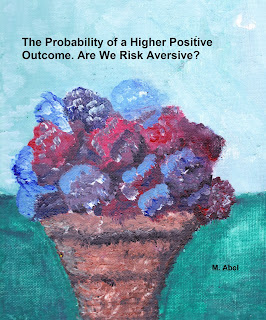 |
| Seeking the best possible outcome. |
People make decisions every day
of their life. Some of these decisions are rational while others appear to be
more irrational. Understanding the evaluative processes of such decision-making
helps business leaders better grasp the choices people make between the
probability of a positive outcome and higher levels of reward. Research helps
show the risk aversive state of normal decision-making as people seek to gain
higher likelihood of positive outcome over higher potential rewards.
Decision making can be defined by
a number of important key parameters that include probability of an outcome,
the size of an outcome, and the variance of an outcome (Christopoulos, et. al.,
2009). When making a decision people try and understand the likelihood that
they will achieve a certain outcome, the potential value of that outcome and
the uncertainty of that outcome. If there is a high likelihood that the object
will be obtained, this object is of great value, and there is low variability
in the possibility of this outcome then there will be higher levels of
motivation to act.
Expected value theory posits that
people decide rationally by understanding the objective worth of choices by
calculating the expected value of a reward times its probability of its outcome
(Milstein & Dorris, 2007). In other words, people will look at the total
value of a reward times its likelihood of occurring. An outcome worth a million
dollars that has a 50% chance of occurring is worth more than a million dollars
with a one in ten chance of occurring.
Prospect theory makes the
argument that decisions are made on the basis of perceived value, perceived magnitude,
and perceived probability of reward (Kahneman, 1979). This perception changes
with the person and the values also change depending on how something is
perceived. Each person would evaluate their prospects differently based upon their
perceptions of worth. Each person and their potential for rational and irrational
decisions are variable and highly subjective
Research conducted by Sharp,
Viswanathan, Lanyon and Barton (2012) attempts to evaluate economic decision
making under risk and ambiguity. The two theoretical constructs under study
focused on decision-making using expected value theory and the other irrational
choices under prospect theory. Subjects needed to choose between two prospects
varying in size and probability in order to maximize their gains. On each trial
the value of the prospects were varied to make a spectrum of choices. Nineteen healthy
participants engaged in the study.
Subjects choose between higher
probability of gain or higher value obtainment. The results indicate the
following:
-Subjects had a preference for
higher probability of gain over the value of the gain.
-Subjects had a hard time
evaluating small differences in value.
-Subjects were risk aversive.
-Subjects had a tendency to favor
higher probability over higher reward.
The research helps highlight the
differences of choices subjects make by varying degrees of probability and
reward. When confronted between higher levels of probability of a positive
outcome or higher rewards, the subjects had a preference for the higher probability
of a positive outcome. People naturally chose the safer route than those routes
with the highest magnitude but the least chance of a desirable outcome.
Understanding these findings can help organizational leaders put within
perspective the value of offering higher levels of security over higher rewards
in the average adult population.
Christopoulos G., Tobler P.,
Bossaerts P, Dolan R. & Schultz W (2009) Neural correlates of value, risk,
and risk aversion contributing to decision making under risk. J Neurosci 29: 12574–12583.
Kahneman D, Tversky A (1979)
Prospect theory: an analysis of decision under risk. conometrica 47: 263–291.
Milstein DM, Dorris MC (2007) The
Influence of Expected Value on Saccadic Preparation. J Neurosci 27: 4810–4818.
Sharp ME, Viswanathan J, Lanyon L., Barton J. (2012)
Sensitivity and Bias in Decision-Making under Risk: Evaluating the Perception
of Reward, Its Probability and Value. PLoS
ONE, 7(4)
Bookmark with Your Social Network
Bookmark with Your Social Network